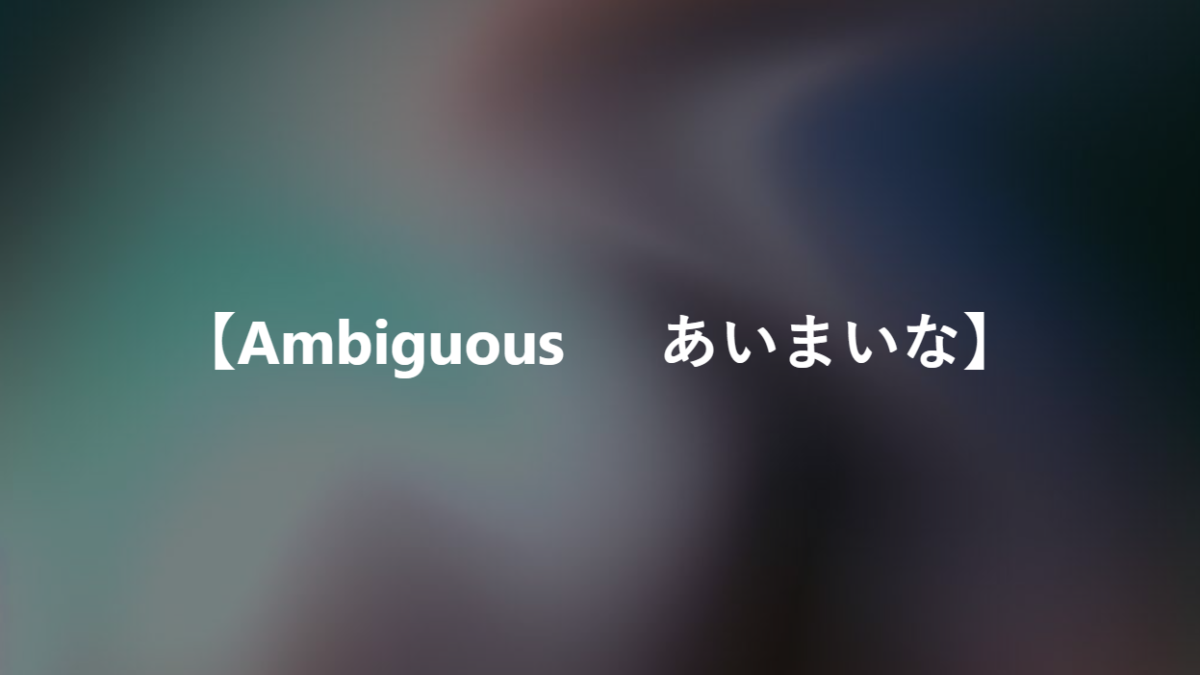Ambiguous /æmˈbɪɡjuəs/
曖昧な、多義的な、どっちつかずの
一つ以上の解釈が可能で、意味がはっきりとしないこと。意図が不明確で、どうとでも取れる状態。
「Ambiguousな言葉は、誤解の元」
📚 意味と用法
ambiguous は、形容詞として、言葉、文章、状況などが「曖昧で」複数の意味に解釈できる状態を表します。意図的に曖昧にされている場合も、単に不明瞭な場合もあります。「どっちつかずの」「はっきりしない」といったニュアンスで、明確さや確実性が欠けていることを示します。
曖昧な指示 (Unclear instructions)
The instructions were ambiguous, and nobody knew what to do.
(指示が曖昧で、誰も何をすべきか分からなかった。)
どっちつかずの返事 (A vague answer)
He gave an ambiguous answer to my question.
(彼は私の質問に、どっちつかずの返事をした。)
🕰️ 語源と歴史
「Ambiguous」は、ラテン語の「ambiguus」に由来します。これは「疑わしい、不確かな」という意味で、さらに「両側へ動かす」を意味する「ambigere」から来ています。「ambigere」は、接頭辞「ambi-」(両側に、周りに)と「agere」(動かす、駆り立てる)から成り立っています。「両方の方向に動かされる」という元のイメージから、どちらか一方に定まらない「曖昧な」状態を指すようになりました。
🔄 類義語
⚡ 対義語
関連する対比
ambiguous (曖昧な) 指示は混乱を招きますが、clear (明確な) 指示は行動を容易にします。
💬 実践的な例文
The end of the movie was ambiguous, leaving the audience to guess what happened.
その映画の結末は曖昧で、観客に何が起こったのかを推測させた。
The wording of the contract is highly ambiguous.
その契約書の言葉遣いは、非常に多義的だ。
She had an ambiguous smile on her face.
彼女は顔にどっちつかずの笑みを浮かべていた。
His role in the company is somewhat ambiguous.
会社での彼の役割は、いくぶん曖昧だ。
To avoid ambiguity, please be as specific as possible.
曖昧さを避けるため、できるだけ具体的に記述してください。
🧠 練習問題
以下の空欄に入る最も適切な単語を選んでください。
1. If something has more than one possible meaning, it is ______.
解説:
一つ以上の意味を持つものは、「曖昧な (ambiguous)」です。
2. The noun form of “ambiguous” is ______.
解説:
形容詞 “ambiguous” の名詞形は “ambiguity”(曖昧さ)です。
3. The opposite of ambiguous is ______.
解説:
“ambiguous” の直接的な対義語は、否定の接頭辞 “un-” をつけた “unambiguous”(曖昧でない、明白な)です。
4. The politician’s ______ statement left everyone confused.
解説:
皆を混乱させたのは、その政治家の「曖昧な (ambiguous)」発言でした。
5. The root “ambi-” in “ambiguous” means ______.
解説:
語源で説明した通り、ラテン語の接頭辞 “ambi-” は「両側に」を意味します。

